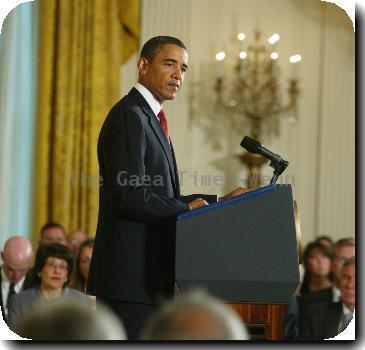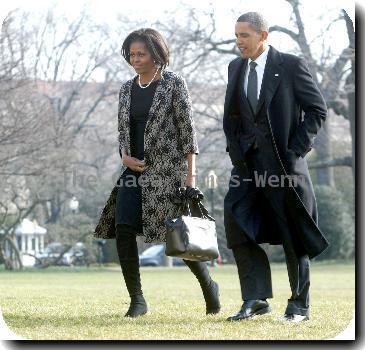Polite race for Kennedy’s Senate seat turns negative as national stakes rise
By Liz Sidoti, APWednesday, January 13, 2010
Polite race for Kennedy Senate seat turns negative
BOSTON — What for weeks had been a polite — even sleepy — race in Massachusetts to fill the late Edward M. Kennedy’s Senate seat has turned negative as the contest tightens, raising the stakes for both parties and the White House in next week’s special election.
In a 48-hour span:
—Democrat Martha Coakley, who had been heavily favored, unleashed a TV ad attacking her GOP opponent, Scott Brown, as “in lockstep with Washington Republicans.”
—The national committee charged with electing Senate Democrats rolled out an ad claiming Massachusetts voters know little about Brown and imploring them not to let him “take them for a ride.”
—The Service Employees International Union went on the air with a spot that says Brown “calls himself independent, but voted with Republican leadership 96 percent of the time,” opposes abortion rights and is backed by some of Sarah Palin’s supporters.
The late-game strategy: use Republicans as a foil in a Democratic state to undercut Brown, who has cast himself as an independent and downplayed his conservative credentials.
The onslaught of negative TV ads and arrival of out-of-state operatives underscore Democrats’ worry that their hold on the seat in a solidly Democratic state is in jeopardy — and that they could lose the pivotal 60th Senate vote needed to pass President Barack Obama’s health care overhaul and other legislation.
Republican-allied groups have gone negative as well, reaching for a long-shot upset and sensing that Brown has momentum in a difficult political environment for Democrats. “Coakley supports massive new spending and the tax increases to pay for it,” says one commercial by the conservative American Future Fund.
The Republican National Committee and the GOP’s Senate campaign committee are working behind the scenes to help elect Brown but aren’t pouring TV money into the race, raising questions about whether they really think Brown can win or whether they are afraid of reminding voters that Brown is a Republican.
They also have withheld campaign appearances by national GOP figures who could hurt Brown, although former New York mayor Rudolph Giuliani will visit Massachusetts on Friday to vouch for the candidate’s anti-terrorism credentials.
Public opinion polls and internal candidate and party surveys show a race fluctuating between a 15-point lead for Coakley to a 2-point lead for Brown. Among the biggest unknowns is voter turnout, since this special election will take place the day after the Martin Luther King holiday weekend when many voters will be traveling.
The Boston Globe endorsed Coakley on Wednesday.
Kennedy’s widow, Vicki, sent out a fundraising e-mail Wednesday that Coakley aides say raised at least $400,000 in four hours and crashed their computer server.
Democrats say all the late national attention could undercut Brown — and save health care for Obama — by energizing complacent voters in the traditionally Democratic state.
Both candidates have vulnerabilities that could provide fodder for more negative ads in the final week.
Coakley said during a debate Monday night that she favored a U.S. troop withdrawal from Afghanistan because terrorists harbored by the Taliban “are gone.” She added: “They’re not there anymore. They’re in, apparently, Yemen and they’re in Pakistan. Let’s focus our efforts on where al-Qaida is.”
Obama cited a continuing terrorist threat late last year in justifying his decision to send more troops to Afghanistan.
Brown, meanwhile, was silenced in the debate when the independent candidate in the race, Joseph L. Kennedy, noted he has been calling for a “JFK-style” across-the-board cut in federal taxes — but opposed a proposed rollback in the Massachusetts income tax two years ago.
Brown also seeks a presidential line-item veto to reduce government spending, but as a state senator he has repeatedly voted to override gubernatorial spending vetoes — many issued when Republican Mitt Romney was governor.
With a week to go in Massachusetts, it’s unclear whether Obama will travel there to campaign for Coakley. White House spokesman Robert Gibbs has repeatedly said Obama is not scheduled to make a campaign visit on behalf of Coakley, but Democrats say it’s a possibility if her new, more aggressive stance doesn’t beat back Brown’s challenge.
That Obama would be dispatched to essentially save Coakley wouldn’t look good for the White House. And a loss could be devastating, raising questions about the president’s political cache.
In the final week, candidates, national parties and interest groups are spending on TV ads alone what both Republican and Democratic strategists estimate could total more than $5 million. That doesn’t count literature filling mailboxes or phone calls filling voicemail.
Both sides also are heavily engaged in turnout efforts, encouraging party activists to make phone calls and travel to the state to canvass neighborhoods for votes.
Sidoti reported from Washington.
Tags: Barack Obama, Boston, District Of Columbia, Health Care Reform, Massachusetts, North America, Political Issues, Sports, Stakes, Terrorism, United States





